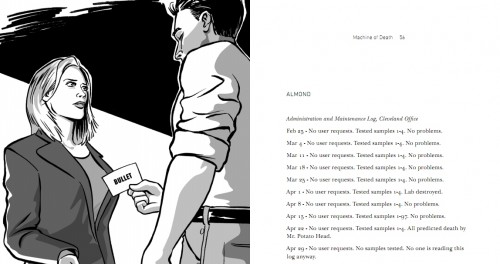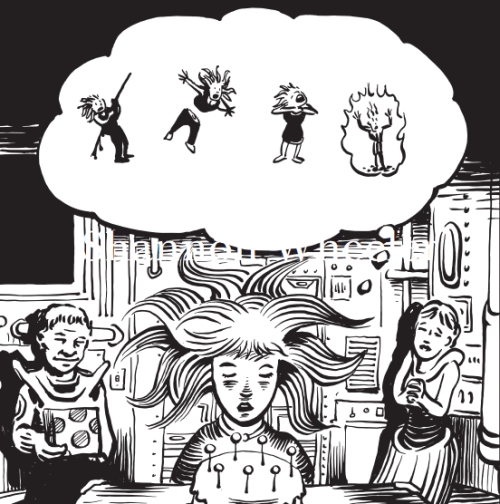TOM FRANCIS
REGRETS THIS ALREADY
Hello! I'm Tom. I'm a game designer, writer, and programmer on Gunpoint, Heat Signature, and Tactical Breach Wizards. Here's some more info on all the games I've worked on, here are the videos I make on YouTube, and here are two short stories I wrote for the Machine of Death collections.
Theme
By me. Uses Adaptive Images by Matt Wilcox.
Search
STARVATION Review
I was a little dubious about this one, solely because one character refers to the other as ‘kid’ – something I’m not yet sure people do in real life. But it’s one of the most interesting settings for a Machine of Death story – one of the few that has the courage to put the machine itself well into the background of the world, and tell a story that is affected by it, but not about it.
It’s about two soliders, stranded on an island, who both know how they will die. One is STARVATION, the other is HOMICIDE. So the entire scenario is overcast by both men endlessly reconjecturing about how their personal prophecy could come true.
That makes it very tense at times, particularly since my twist-happy brain likes to spend its downtime trying to pre-empt every eventuality. But I can honestly say the ending surprised me, and in a way that made me the story seem smarter than me.
Machine of Death: a book that appears to be good so far. It’s now $18 from Amazon or Topatoco in the US, or in the UK for £11.50 with free shipping from The Book Depository. The whole thing is free in PDF form, and is trickling out steadily as an audiobook in podcast form. My story for it is online here.
ALMOND Review
A lab assistant charged with one of the first machines of death refuses to test himself, while everyone around him succumbs.
Pure pleasure to read – or in my case, listen to. It’s the longest story so far, but every time reader Kevin McShane (who sounds excitingly like Peter from Fringe) pauses for more than a second, you’re hoping it’s not going to end.
The whole story is a log, that rapidly devolves into a journal, written in a friendly and clear-headed style. The watch-word of this collection has been ‘refreshing’, and what’s refreshing about Chernega’s protagonist is his almost complete lack of curiosity. He’s curious about other people’s predictions, but he’s one of the few characters in the book so far not even tempted by the prospect.
His diary charts the escalating public reaction to the machines, covering some of the same territory as my own, and I’m honoured they didn’t just scrap mine when they read this. ALMOND plays much more with the machine’s enjoyably sinister ambiguity – when it starts giving more than a few people GOVERNMENT, you know something interesting’s about to go down.
Some predictions are clever enigmas that are unraveled during the story, others are unexplained and seemingly unexplainable, and others seem to be openly fucking with you. That’s important, because the tension the story builds hinges on the narrator inferring a personality to the machine – one that becomes increasingly infuriating to him.
It has a punch, but doesn’t conform to the usual twist-story structure: the set up is almost immediately before the payoff, which prevents it from risking anticlimax. The voice, humour and escalating intrigue don’t need a giant question mark hanging over them to keep the story compelling throughout.
Machine of Death: a book that appears to be good so far. It’s now $18 whether you buy it from Amazon or Topatoco, and I think Topatoco have faster international shipping. The whole book is free in PDF form, and is trickling out steadily as an audiobook in podcast form. My story for it is online here.
TORN APART AND DEVOURED BY LIONS Review
An insurance salesman’s prediction turns his life around.
Refreshingly unmopey, nonjudgmental and un-non-funny. This is an exploration of the positive impact a prediction could have: not by implying a long and happy life, but by implying a death so exotic you have to assume things are going to get more interesting from here.
That’s really all there is to it, but it’s witty, fun, breezy and explores its concept with an infectious curiosity. The author is clearly a funny guy with a great writing voice, and he lets a little of it seep into every character. In a short story, that doesn’t hurt.
Machine of Death: a book that appears to be good so far. It’s now $18 whether you buy it from Amazon or Topatoco, and I think Topatoco have faster international shipping. The whole book is free in PDF form, and is trickling out steadily as an audiobook in podcast form. My story for it is online here.
DESPAIR Review
You’re a doctor, and six unconscious patients come in with a mysterious condition. Their Machine of Death predictions all read: TESTS. What do you do?
A great story, and a great premise. All the stories hinge on the machine in some way, but it’s the sign of a great one when it feels like it’d be worth making up the machine just to tell it.
It’s also cool to have a story that’s serious and urgent, rather than chin-strokey. From 800 submissions that must have been tediously similar at times, you can see why a medical drama would stand out to Malki and co.
If I had to criticise, I’d say the thing with the security guard, which I won’t spoil, felt jammed in for character development. Not enough room in a short story to make it feel natural. And like any story that ends on a question, it’d be better if it didn’t.
Neither bothered me much, and I’m expecting this to remain one of my favourites.
Machine of Death: a book that appears to be good so far. It’s now $18 whether you buy it from Amazon or Topatoco, and I think Topatoco have faster international shipping. The whole book is free in PDF form, and is trickling out steadily as an audiobook in podcast form. My story for it is online here.
FUDGE Review
The second story in the collection to take its title from a confectionary-related death that turns out to be irrelevant to the main characters. And like Flaming Marshmallow, that put me off it for a while.
Fudge is not quite a twist story, but the whole thing does lead up to a prediction, and the nature of the prediction is what gives it its punch. It doesn’t count as a twist because we don’t really find out what it means, only how it affects the protagonist. And then, Fudge ends.
That’s the other thing you can do with a short story – end on a note that is not so much “Oh my God what the fuck barbecue” as “Hmmm.” It’s good, and well-read by author Kit Yona in the podcast version, but personally I quite like to be all “Oh my God what the fuck barbecue.”
Machine of Death: a book that appears to be good so far. It’s now $18 whether you buy it from Amazon or Topatoco, and I think Topatoco have faster international shipping. The whole book is free in PDF form, and is trickling out steadily as an audiobook in podcast form. My story for it is online here.
FLAMING MARSHMALLOW Review
The book I’m reading just got putdownable, so I’ve finally dug into Machine of Death. I’d also been following the podcast, trying each entry to see if I like the reader’s voice, and saving it to read in the book if I don’t. What? That’s not weird. I’m overly fussy about reading voices.
My plan is to review every story in the book except my own. We’ve had lots of lovely reviews, but in a normal review you don’t analyse every story – most don’t even mention standouts. But short story collections are diverse, if they’re good, and for all I know ours is both. I don’t know any of the other authors personally, except for brief e-mail exchanges about the book, so it’s not hard to be objective. I will be more polite than I am in game reviews, though, since I can’t claim to be well-read or good at analysing literature.
A school girl frets about what social clique her prediction will put her in.
I have to admit I avoided this story at first, because the title made me think “Sigh, comedy death.” It’s not a comedy, and that prediction has almost nothing to do with it.
Instead, it’s an incredibly focused picture of what feels like a very thoroughly imagined version of the Machine of Death world, set long after any initial shock or uncertainty about the use of the machine. Everyone’s so settled into it that schoolkids define their hang-out groups and social status by their predicted deaths; violent ones the coolest.
Something rings very true about the ease with which kids accept the morbidity of death predictions, and get more excited about the possibilities than bogged down by the fatalism. The story’s payload, to me at least, is a situation where a girl is desperately hoping for the stickiest possible end, while her father longs for something dull and distant.
She does get her prediction, but the only failing of Marshmallow is that it isn’t immediately clear what it means. That ambiguity’s a useful tool in other stories, but here I’m just not totally sure if the words are referring to something I’m not familiar with. The characters understand it, and we understand it through them, but the scene could have had more punch if it was something we could immediately grasp the implications of, to both parties.
This feels like one of the most convincing worlds, though, and the voice of the narrator is authentically young and fun.
Machine of Death: a thing that appears to be good so far. It’s now $18 whether you buy it from Amazon or Topatoco, and I think Topatoco have faster international shipping. The whole book is free in PDF form, and is trickling out steadily as an audiobook in podcast form. My story for it is online here.

